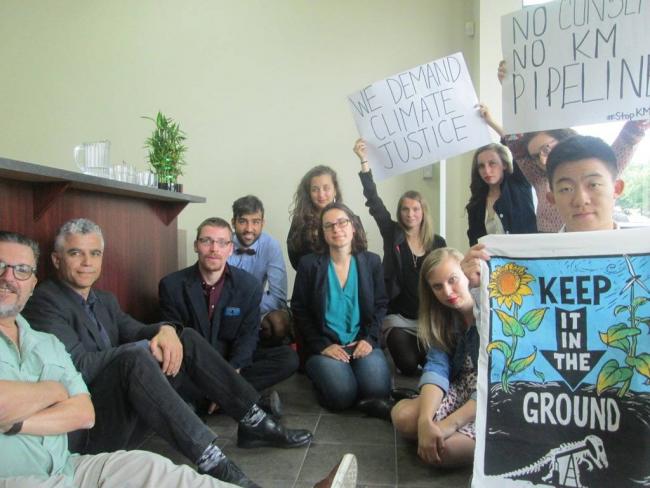Articles Menu

May 26, 2016 - Ultimately, it’s up to Justin Trudeau. Faced with his first pipeline challenge, the Liberal prime minister can say either yes or no. A decision has to be made before the end of this year on Kinder Morgan’s plan to expand its Trans Mountain oil pipeline.
The National Energy Board has given its conditional approval for the $6.8 billion project.
Now that the ball in the federal Liberal government’s court, environmentalists are stepping up the pressure on Liberal MPs.
On Thursday (May 26), 11 activists occupied the local office of Vancouver Granville MP and Justice Minister Jody Wilson-Raybould.
They want Canada’s first aboriginal justice minister, known in indigenous communities as Puglaas, or a woman born to noble people, to speak out.
“We’re specifically asking her to make a statement regarding the Kinder Morgan Trans Mountain project as it’s violating the United Nations Declaration on the Rights of Indigenous Peoples [UNDRIP], which she fought for Canada to sign,” Mary Lovell told the Straight at the sidelines of her group’s direct action.
Lovell noted that 17 First Nations along the route of the pipeline expansion are opposed to the project, which will triple capacity to 890,000 barrels per day.
 Mary Lovell says Canada cannot meet its climate commitments if it builds more pipelines.CARLITO PABLO
Mary Lovell says Canada cannot meet its climate commitments if it builds more pipelines.CARLITO PABLO
Trudeau said before his election that he favours the Trans Mountain project. But during the election campaign, he also said that he will reset the button on pipeline reviews.
In May this year, the Trudeau government announced that it will adopt the UNDRIP, a landmark document that sets out the rights of indigenous peoples around the world.
Indigenous Affairs Minister Carolyn Bennett made the pledge following a speech by Wilson-Raybould at the U.N. in New York.
“Let us make it a century where nation states and indigenous peoples work in partnership towards true reconciliation that supports strong and healthy indigenous peoples that are in charge of and in control of their own destinies,” Wilson-Raybould said in her speech.
Although not legally binding, the UNDRIP pus a strong emphasis on getting the consent of indigenous peoples on matters that affect their lives.
One part of Article 32 reads: “States shall consult and cooperate in good faith with the indigenous peoples concerned through their own representative institutions in order to obtain their free and informed consent prior to the approval of any project affecting their lands or territories and other resources, particularly in connection with the development, utilization or exploitation of mineral, water or other resources.”
Article 19 instructs: “States shall consult and cooperate in good faith with the indigenous peoples concerned through their own representative institutions in order to obtain their free, prior and informed consent before adopting and implementing legislative or administrative measures that may affect them.”
At the sit-in, Lovell also said that 20 municipalities are not in favour of a twinned pipeline.
The planned pipeline expansion will lead to an increase in the number of oil tankers moving through Burrard Inlet from around 60 to more than 400 per year.
Lovell also said that by approving new pipelines, the Trudeau government will not meet its commitment to limit global warming.
“The Liberal government has already committed to keeping the global temperature under 1.5 degrees Celsius, and in order to meet those targets, they have to stop building these pipelines,” she said.
The activist was referring to the agreement reached by 195 nations in Paris last year at the UN climate change conference. The countries pledged to keep global temperature rise this century below two degrees Celsius. They also promised to work to limit the temperature increase even further to 1.5 degrees Celsius above pre-industrial levels.
Top Photo: Carlito Pablo